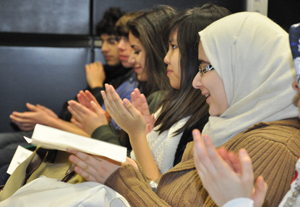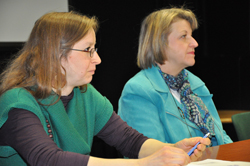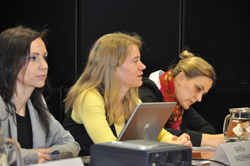


To observe International Women's Day 2011 the United Nations Information Service (UNIS) Vienna invited Austrian high school students of Bundesrealgymnasium 7 to a panel discussion on "Equal Access to Education, Training and Science and Technology: Pathway to Decent Work for Women" with female experts from the International Atomic Energy Agency (IAEA), the United Nations Industrial Development Organization (UNIDO) and the United Nations Office on Drugs and Crime (UNODC).
Sonja Wintersberger, Officer-in-Charge of UNIS Vienna, welcomed the students and referred to the 100th anniversary of International Women's Day and to the launch of the United Nations Entity for Gender Equality and the Empowerment of Women - UN Women.
Maria Naderhirn, NGO/CSO Liaison UNIS Vienna, moderated the discussion and referred to the interconnectedness of women's issues to the Millennium Development Goals.
UNIDO Industrial Development Officer and Information and Communication Technologies (ICT) Programme Expert Barbara Kreissler pointed to the role of UNIDO in promoting industrial development for poverty reduction. "UNIDO focuses, as part of its overall mandate, on building and strengthening local capacities through the use of ICT applications. By encouraging small and medium enterprises to use innovative ICT solutions we create a dynamic bottom-up process of economic development ," she said.
"Women in developing countries, particularly in remote and rural areas, still lack access to the necessary training, skills and technology. Access to these tools could help them to gain new perspectives in employment and break the cycle of poverty," she stressed.
Silke Albert, Crime Prevention Expert with the UNODC Anti Human Trafficking Unit, outlined UNODC's work in combating human trafficking and migrant smuggling: "There is no one well-defined victim of human trafficking - men, children, boys and girls are trafficked for a variety of purposes, even people of different age. However, we identified that most often reported victims are women and children," she said.
In response to the question, how traffickers convince victims to leave their towns or countries, she said that many victims are tricked by traffickers, dreaming of a better life and hope to find this better life elsewhere. "These hopes are then exploited by the traffickers who make false promises of better jobs and better conditions elsewhere," she said. "Traffickers also exert control by creating situations of dependence and debt bondage, which makes it difficult for the victims to escape," she continued.
IAEA Nuclear Safeguards Analyst and President of WiN-Global, a worldwide, not-for-profit professional network of over 2500 women and men working in the nuclear field, Eva Gyane briefed the students on the work of the IAEA, the benefits of nuclear and radiation applications and the challenges of being Safeguards Analyst: "It is a highly interesting and multifaceted profession, and one of the most rewarding aspects of my work is the feeling that it directly contributes to world peace," she stressed.
"Traditionally, the world of nuclear science and technology is a male-dominated field and women still remain underrepresented - but times are changing. A career in nuclear science and technology can be highly attractive and rewarding, and I encourage more women to pursue a career in this field, she furthermore stated.
The students showed great interest in the work of the organizations and the day-to-day work of experts at the UN. The lively discussions ranged from the protection of victims of human trafficking, implementation of measurements for nuclear safety and security worldwide to women's contribution to economic and social development.
Ways to promote access and participation of women and girls in education, training, science and technology, including equal access to full employment and decent work, were also discussed at the recent 55 th session of the Commission on the Status of Women at UN Headquarters, New York. Information on the outcome can be found at http://www.un.org/womenwatch/daw/csw/55sess.htm.